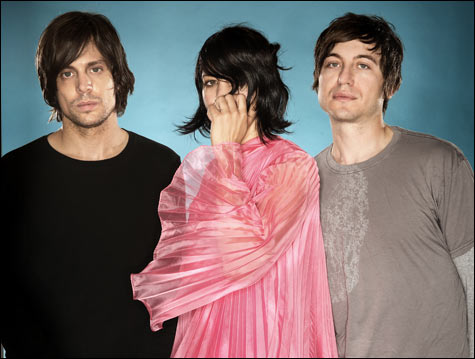
WELCOME RETURN: After their forehead-smackingly good debut CD, Autolux (Greg Edwards, Carla Azar, and Eugene Goreshter), had disappeared — until now. |
Autolux have been spending more than a few rainy days indoors. Following a sterling run in 2005 — when, after releasing one of the best records of 2004, the ad hoc space-rock trio opened for Beck and Nine Inch Nails and won hearts with little fanfare — they've been torturing fans with an almost total lack of output. It's as if they'd been hiding in their bedrooms.
"It's the most bizarre, perverse thing," admits guitarist Greg Edwards over the phone from LA. "I don't understand why people haven't abandoned us completely." According to Edwards, they've been operating in a stripped-down DIY mode, spending lengthy sessions finishing the follow-up to Future Perfect (DMZ/Red Ink/Columbia) while floating in record-label purgatory.
"It's really not that different from when we were on Columbia," he says. "You just do everything, so it's basically less diluted, instead of getting someone else to do it and waiting to see if they do it wrong."
That they're heading out on tour again for the first time since 2005 (they'll play the Paradise next Thursday) is the latest hint they're coming out of the storm cellar for real. A couple of songs that surfaced last year — an UNKLE collaboration and an amazing Internet single — proved Future Perfect wasn't a fluke. Otherwise, they've remained quiet.
"It seems like interest has actually grown," says Edwards. "Maybe it's just the suspense, and after we release something and go out and play it, everything will just deflate."
The reason people have stayed tuned in is pretty simple: Future Perfect was forehead-smackingly good and hasn't gotten any worse with time. Born from the remains of '90s alt-rock groups (Edwards played bass in Failure and drummer Carla Azar played in Ednaswap; bassist/vocalist Eugene Goreshter completes the line-up), the band latched onto washy shoegazer guitar tropes, muggy drumming, and heavy clouds of mood and hung them up on a toothpick framework that gets better every time you listen. It wasn't current — Azar's lopsided beats looked ahead to an approach Portishead would bite two years later, and some of the guitars went back to Cobain and Corgan and even Brainiac. But that's what ruled about it.
Since the release of Future Perfect in 2004 and the following year of touring, they've run into some rough patches. DMZ, which was run by T Bone Burnett (he produced Future Perfect), dissolved in 2006, leaving them orphaned inside the Columbia mega-label bureaucracy. They landed in the Epic division, but Edwards says relations fizzled there after the band failed to produce a new record on demand. "After we did that first record, I almost had an anxiety attack anytime I thought about having to record again. There's no way I could envision it, because everything is contingent on this series of accidents."
All the same, the band have held down the fort. Azar has stepped up as the default manager, maintaining contacts and orchestrating the release of a tour-only seven-incher (a preview track from the album b/w an old instrumental).
"It's got its pluses and minuses," says Edwards of working without a net. "You have to be diligent and look at it as a business — which maybe a lot of artists don't want to concern themselves with."